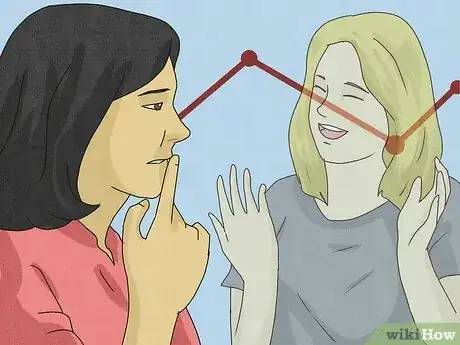This article was co-authored by Catherine Boswell, PhD. Dr. Catherine Boswell is a Licensed Psychologist and a Co-Founder of Psynergy Psychological Associates, a private therapy practice based in Houston, Texas. With over 15 years of experience, Dr. Boswell specializes in treating individuals, groups, couples, and families struggling with trauma, relationships, grief, and chronic pain. She holds a Ph.D. in Counseling Psychology from the University of Houston. Dr. Bowell has taught courses to Master’s level students at the University of Houston. She is also an author, speaker, and coach.
There are 12 references cited in this article, which can be found at the bottom of the page.
This article has been viewed 41,793 times.
Passive-aggressive behavior is a way of dealing with conflict without really dealing with it, and it can damage relationships. Passive-aggressive people tend to seem agreeable at first, but later behave differently; you might hear them described as "two-faced."[1] These people tend to hold in their feelings of disapproval, anger, frustration, or pain and not talk to the person who has caused pain (the "passive" part), then later act in "aggressive" ways that sabotage or undermine the relationship or hurt the other person in retaliation. Do you suspect you are dealing with passive aggression? Learn to spot passive-aggressive behavior in order to deal with it in your own personal relationships.
Steps
Recognizing Passive-Aggressive Behavior
-
1Watch for attempts to get a rise out of you. People who are passive-aggressive enjoy making other people get angry and lose their cool, but the passive-aggressive person will stay calm and act as though he or she is not doing anything wrong.[2] If you feel as though someone is trying to upset you and the person seems friendly and calm, then you may be dealing with someone who is passive-aggressive.[3]
- For example, perhaps you have noticed that your roommate has been using your makeup even after you have asked her not to. It might be passive-aggression if you confront her about it and your roommate plays dumb. She might pretend that she did not know it bothered you and she may even seem take pleasure in upsetting you.
-
2Identify back-handed compliments. Someone who is passive-aggressive might give back-handed compliments. Back-handed compliments are compliments that are actually insults in disguise. The recipient of a back-handed compliment may not even recognize the insult, but the person delivering it will feel satisfaction from delivering the back-handed compliment.[4]
- For example, a passive-aggressive person might compliment a rival co-worker who has just been promoted by saying something like, “Congratulations! It must feel pretty good to finally get promoted after trying for so many years.” This compliment suggests that the person who has been promoted is less successful because it took so long to get the promotion.
Advertisement -
3Reflect on broken promises or commitments. Passive-aggressive people often make commitments, but then later go back on their commitment as a form of payback. Someone who is passive-aggressive may often break promises or commitments as a way to frustrate other people.[5]
- For example, a friend might agree to help you with a chore at your house, but then text you that morning to say she isn't feeling well and can't help. While this might be understandable if it’s a one-time thing, a friend who consistently has excuses for why she can't help may be using passive-aggression.
-
4Check for sulking, withdrawal, and unspoken feelings. Passive-aggressive behavior is marked by a refusal to talk about things that are upsetting. A passive-aggressive person claims to be ok, but is actually fuming on the inside.[6]
- For example, your passive-aggressive friend might insist, "I'm not upset!" when she clearly is, give you the silent treatment during a disagreement, or avoid responding to your calls or messages.[7]
- On the other hand, some people have trouble discussing their feelings but aren't necessarily passive-aggressive. When a person is truly passive-aggressive, they display sullenness or withdrawal as well as other traits of passive aggression, especially the tendency to lash out or sabotage the relationship later.
-
5Consider how the person treats others. In a new relationship, even an extremely passive-aggressive person might control their unhealthy tendencies toward you at first. But you can get clues to whether this person is a healthy communicator or passive-aggressive by observing how he or she treats others, especially past partners or authority figures like parents or bosses.[8]
- Does this person talk badly about others but never confront them about what is bothering her? Does she sabotage her relationships with others? Does she string people on and then disappoint them? Does she withhold affection, attention, or use her children as a bargaining tool (for example, in her relationship with an ex-husband or with her parents)? These are features of passive-aggressive personalities.
- Remember that even if this friend or partner does not treat you badly, once she becomes more comfortable in the relationship she is more likely to treat you the same way she treats others.
-
6Pay attention to sarcasm. While many people use sarcasm as a form of humor, someone who is constantly sarcastic might be masking the fact that he has trouble articulating how he actually feels.[9]
- Remember, passive-aggressive behavior is marked by someone who has trouble saying what he feels in the moment, so he holds in his frustration or anger and then acts on it later. Frustration and anger might be expressed by little moments of sarcasm, particularly when it is hurtful or biting humor.[10]
-
7Look for patterns. All of the features of passive-aggressive behavior, including sarcasm, broken promises, giving excuses, avoidance, and a martyr complex, are behaviors that even healthy people might display every now and then.
- The problem is when these behaviors form a pattern or interfere with relationships because of their regularity.[11]
Confronting Someone Who is Passive-Aggressive
-
1Be honest.[12] Tell the person, in direct but not harsh or dramatic terms, how their behavior has affected you. Try to focus on yourself and your feelings rather than the other person.[13] For example, instead of saying, "You sabotaged our project at work," try saying, "I noticed that our project wasn't the best, and I want us to be sure it is better next time."[14]
- When you talk to someone and tell him that his behavior is hurting you, it is likely that he will deny everything (remember, passive-aggressive people don't like to talk about their feelings-- they certainly don't like to be called out about them!). Stick to facts and give examples, but be prepared for resistance and denial.
-
2Try to be understanding. A passive-aggressive person might harbor feelings of low self-worth or issues from his or her childhood that makes it difficult to communicate feelings effectively.
- Talking together can help you understand the possible roots of the passive-aggressive behavior, if the person is willing to open up a bit and you are willing to suspend judgment and be understanding. [15]
- Ask questions about his or her childhood, youth, early relationships (especially ones that might have ended badly), or other life scenarios where speaking his or her mind might have backfired. Remember, passive-aggressive behavior is often a coping strategy used by people who have had negative experiences that left them feeling helpless or powerless.[16]
-
3Decide if this relationship is worth saving. Depending on how a person responds when confronted about their passive-aggressive behavior, you might realize that there is a good chance of salvaging the relationship, or that this person is rigid in his or her ways and unlikely to change.[17]
- Many times, avoidance is the only strategy that can use to avoid being a victim of passive-aggressiveness. But if the other person recognizes the problem and is willing to work on it, there are many ways to improve your relationship by working on your communication strategies.
Communicating in Relationships Marked By Passive Aggression
-
1Build confidence. Every party in a relationship needs confidence in order to communicate more effectively without resorting to passive-aggressive behavior.
- Confidence in the relationship itself: In order to feel secure to communicate your true feelings when you are hurt, offended, or angered, you have to feel confidence that whatever you do or say, you will be accepted and loved. Building confidence in your relationship is a process that takes time, and is accomplished by being consistently reliable and there for each other no matter what.[18]
- Confidence in his or herself: In order for a person to speak his mind, he has to feel that he has worth and that his ideas and feelings are worth listening to. The passive-aggressive partner, in particular, needs to work on building his confidence level to make this or any other relationship successful. Check out this helpful wikiHow article for tips on how to build self confidence.
-
2Learn to recognize your feelings. This step is crucial for both people in a relationship marked by passive aggression. Many times people who are passive-aggressive do not recognize and rightly identify their own feelings as they feel them, then later reflect on scenarios and realize they were uncomfortable, hurt, etc.
- Learn how anger, sadness, discomfort, or other feelings register in your own physical body. When you experience an emotional response, take an inventory of your body: does your heart race, do your palms sweat, does your chest feel tight? Do you experience difficulty thinking clearly? Do you have trouble forming words? Later, think back on the situation and try to identify how you were feeling. Understanding how you felt physically in the moment and attaching those feelings to emotional responses will help you name your feelings in the moment next time.
-
3Set new rules for communicating. If a relationship has already suffered damage because of past behaviors like passive aggression, the old spoken or unspoken rules for your relationship clearly were not working. It is important to openly communicate new guidelines for behavior so that everyone knows what the expectations are.
- Be respectful. Keep mature, sensible ground rules for disagreements, including no slamming doors, no name-calling, no sarcasm, no insults or threats, or whatever else signifies respect to you.[19]
- Give each other space. Recognize that some people need a cooling off period after a disagreement before they can discuss the disagreement rationally and come to mutually satisfying solutions.
-
4Don't be an enabler. It is common for people to gravitate toward passive-aggressive friends or romantic partners because of some psychological desire to help "fix" the person or because the person's pathological behavior feels familiar and safe (for example, if you had passive-aggressive parents growing up, you might seek passive-aggressive partners or friends).[20]
- You might be contributing to passive-aggressive treatment from a partner or friend if you cover for him or her, making excuses for bad behavior or broken commitments, and "rescuing" him or her from poor choices.[21]
- You might also be enabling the behavior by being a silent victim, not pointing out the behavior and letting him or her get away with mistreating you. This teaches your partner that you will not challenge bad behavior.[22]
- You might also be encouraging passive aggression if you punish your partner or friend for speaking their mind. Do you get sulky or angry if your friend says they don't want to hang out? That type of behavior might lead to someone making excuses or breaking commitments for fear of angering you. Similarly, if you refuse to engage in discussions about feelings, your partner is less likely to open up to you and more likely to harbor resentment.
Expert Q&A
Did you know you can get expert answers for this article?
Unlock expert answers by supporting wikiHow
-
QuestionHow do you communicate with a passive aggressive person?
 Liana Georgoulis, PsyDDr. Liana Georgoulis is a Licensed Clinical Psychologist with over 10 years of experience, and is now the Clinical Director at Coast Psychological Services in Los Angeles, California. She received her Doctor of Psychology from Pepperdine University in 2009. Her practice provides cognitive behavioral therapy and other evidence-based therapies for adolescents, adults, and couples.
Liana Georgoulis, PsyDDr. Liana Georgoulis is a Licensed Clinical Psychologist with over 10 years of experience, and is now the Clinical Director at Coast Psychological Services in Los Angeles, California. She received her Doctor of Psychology from Pepperdine University in 2009. Her practice provides cognitive behavioral therapy and other evidence-based therapies for adolescents, adults, and couples.
Licensed Psychologist Speak your mind. It is important to not be "passive" and avoid discussing how you feel. At the same time, it can be hard for someone with passive-aggressive tendencies to say what he is feeling. Instead, come up with strategies to ensure that each party can say what they feel and what they need without worrying about negative consequences.
Speak your mind. It is important to not be "passive" and avoid discussing how you feel. At the same time, it can be hard for someone with passive-aggressive tendencies to say what he is feeling. Instead, come up with strategies to ensure that each party can say what they feel and what they need without worrying about negative consequences. -
QuestionHow do I deal with passive-aggressive behavior?
 Catherine Boswell, PhDDr. Catherine Boswell is a Licensed Psychologist and a Co-Founder of Psynergy Psychological Associates, a private therapy practice based in Houston, Texas. With over 15 years of experience, Dr. Boswell specializes in treating individuals, groups, couples, and families struggling with trauma, relationships, grief, and chronic pain. She holds a Ph.D. in Counseling Psychology from the University of Houston. Dr. Bowell has taught courses to Master’s level students at the University of Houston. She is also an author, speaker, and coach.
Catherine Boswell, PhDDr. Catherine Boswell is a Licensed Psychologist and a Co-Founder of Psynergy Psychological Associates, a private therapy practice based in Houston, Texas. With over 15 years of experience, Dr. Boswell specializes in treating individuals, groups, couples, and families struggling with trauma, relationships, grief, and chronic pain. She holds a Ph.D. in Counseling Psychology from the University of Houston. Dr. Bowell has taught courses to Master’s level students at the University of Houston. She is also an author, speaker, and coach.
Licensed Psychologist
Warnings
- Passive-aggressive behavior can veer into emotional or psychological abuse. Warning signs to look for include a partner who humiliates, insults, or degrades you; a partner who attempts to control you or make you feel ashamed; a partner who accuses you of things you didn't do or blames you for their problems; a partner who does not care about your feelings; or a partner who does not allow you to have any personal boundaries.[23]⧼thumbs_response⧽
References
- ↑ https://www.psychologytoday.com/blog/communication-success/201401/how-spot-and-deal-passive-aggressive-people
- ↑ Catherine Boswell, PhD. Licensed Psychologist. Expert Interview. 29 December 2020.
- ↑ https://www.psychologytoday.com/blog/passive-aggressive-diaries/200909/backhanded-compliments-and-angry-smiles-passive-aggression
- ↑ https://www.psychologytoday.com/blog/passive-aggressive-diaries/200909/backhanded-compliments-and-angry-smiles-passive-aggression
- ↑ https://www.psychologytoday.com/blog/communication-success/201501/6-tips-dealing-passive-aggressive-people
- ↑ https://www.psychologytoday.com/blog/passive-aggressive-diaries/201011/10-things-passive-aggressive-people-say
- ↑ https://www.psychologytoday.com/blog/passive-aggressive-diaries/201011/10-things-passive-aggressive-people-say
- ↑ https://www.psychologytoday.com/blog/communication-success/201501/6-tips-dealing-passive-aggressive-people
- ↑ https://www.psychologytoday.com/blog/communication-success/201501/6-tips-dealing-passive-aggressive-people
- ↑ https://www.psychologytoday.com/blog/passive-aggressive-diaries/201011/10-things-passive-aggressive-people-say
- ↑ https://www.psychologytoday.com/blog/communication-success/201401/how-spot-and-deal-passive-aggressive-people
- ↑ Liana Georgoulis, PsyD. Licensed Psychologist. Expert Interview. 6 September 2018.
- ↑ Catherine Boswell, PhD. Licensed Psychologist. Expert Interview. 29 December 2020.
- ↑ https://www.psychologytoday.com/blog/communication-success/201401/how-spot-and-deal-passive-aggressive-people
- ↑ https://www.psychologytoday.com/blog/communication-success/201501/6-tips-dealing-passive-aggressive-people
- ↑ https://www.psychologytoday.com/blog/communication-success/201501/6-tips-dealing-passive-aggressive-people
- ↑ https://www.psychologytoday.com/blog/communication-success/201501/6-tips-dealing-passive-aggressive-people
- ↑ https://www.psychologytoday.com/blog/turning-point/201404/5-strategies-build-trust-and-increase-confidence
- ↑ http://www.centersforfamilychange.com/relationship_problems_respect.htm
- ↑ https://www.psychologytoday.com/blog/communication-success/201501/6-tips-dealing-passive-aggressive-people
- ↑ https://www.psychologytoday.com/blog/communication-success/201501/6-tips-dealing-passive-aggressive-people
- ↑ https://www.psychologytoday.com/blog/communication-success/201501/6-tips-dealing-passive-aggressive-people
- ↑ http://psychcentral.com/blog/archives/2013/02/20/signs-of-emotional-abuse/













































































Medical Disclaimer
The content of this article is not intended to be a substitute for professional medical advice, examination, diagnosis, or treatment. You should always contact your doctor or other qualified healthcare professional before starting, changing, or stopping any kind of health treatment.
Read More...